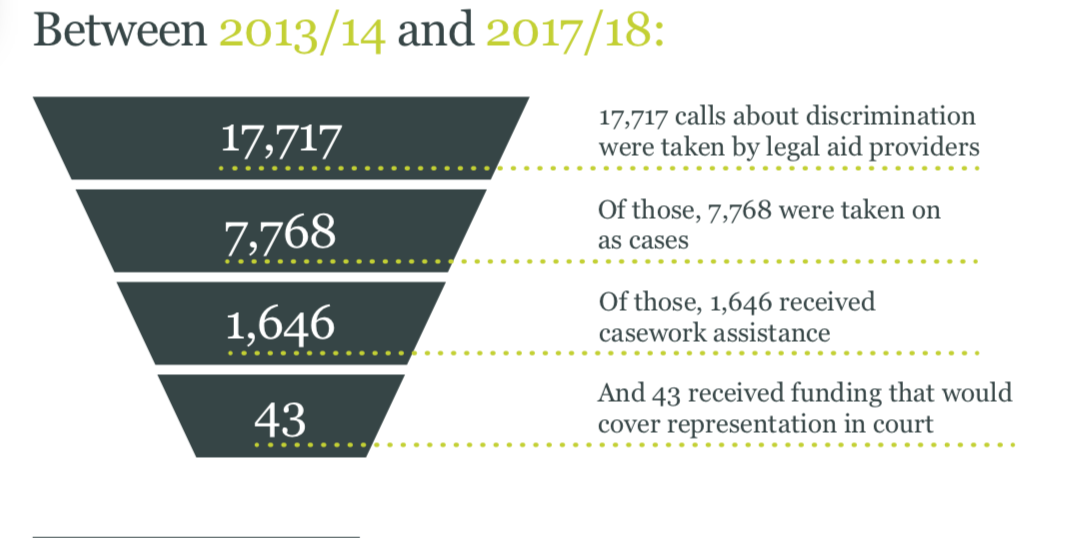Victims of discrimination were being denied access to justice and offenders going unchallenged as a result of a ‘failing’ legal aid system, according to the human rights watchdog. A new report by the Equality and Human Rights Commission (EHRC) revealed that very few people were getting the representation they need in courts or tribunals. Between 2013/14 and 2017/18 no workplace discrimination cases were backed by legal aid for representation in the employment tribunal and only one in 200 cases taken on by discrimination specialists received funding for representation in court.
The EHRC argued that the rules ‘effectively limit funding to cases with high compensation awards’ and ‘[missed] the point’ as discrimination cases were ‘about challenging unacceptable behaviour and upholding rights than obtaining financial awards’. ‘Legal aid was specifically set up to ensure that those who have been wronged, but cannot afford their own legal representation, can access justice,’ commented EHRC chair David Isaac. ‘The threat of legal action is a powerful deterrent for perpetrators and makes it clear that society will not tolerate injustice. ‘Challenging complex issues such as discrimination should never be a David vs Goliath battle, and the system is failing if individuals are left to fight cases themselves at an employment tribunal or in court.’
The introduction of tribunal fees in 2013 led to a drop of around 70% in the number of claims. Despite the fees being abolished in 2017 when the Supreme Court held them unlawful, the Commission noted that the number of claims had yet to recover to the pre-2013 levels. While legal aid is available for advice and representation in certain types of discrimination case, it does not cover tribunals. ‘This means that individuals must either pay privately for representation or represent themselves, often against an opponent with more resources and professional legal representation,’ the EHRC noted. ‘This “inequality of arms” is particularly stark when cases are factually and legally complex, which is often true of discrimination claims.’
Since LASPO (Legal Aid, Sentencing and Punishment of Offenders Act 2012), most people seeking help for a discrimination issue are obliged to contact a call centre through a system known as the telephone gateway. They can then be referred for face-to-face advice. Of 7,768 discrimination cases taken on between 2013/14 and 2017/18, only 18 such referrals were made. Most gateway cases received only telephone advice (i.e., no casework and no representation ) and just 13% resulted in a positive outcome. The commission also revealed ‘an unexplained disparity’ between the number of white and ethnic minority service users receiving positive outcomes.
Only a tiny number of gateway cases (0.5%) received funding for representation. The EHRC reckoned that this was mainly because of two misunderstanding about the rules. The first is that the discrimination claims were often treated as being ‘primarily for damages’ even when they might have been seeking an injunction or declaration. The ‘cost benefit’ test for claims simply compared likely cost of the case with likely damages and it was difficult for discrimination claims to pass the test because ‘their complexity means legal costs tend to be high, while damages awards tend to be low’. The second misunderstanding was the assumption that a discrimination claim would be brought in the small claims track where funding is not available. The group pointed out that the complexity of claims meant they were often allocated to another track where there was funding.
It also found that the government’s so called ‘safety net’ mechanism – the exceptional case funding regime – was ‘not usually available’ and ‘not working as it should’. Only ten applications were made for exceptional funding for discrimination cases in a five-year period and none were granted.
The group also found that people living below the poverty line were not financially eligible for legal aid. ‘There is a growing justice gap between those who are eligible for legal aid and those who can afford to pay for their own legal advice. On top of that, the complex evidence requirements can put some people off applying for funding,’ the group said.







